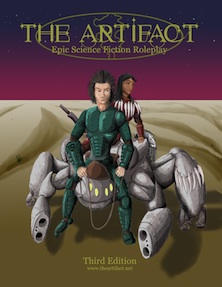RPGs are complicated webs of a game. They can be immensely satisfying or to many, far too dense to cut through to find satisfaction. For a while, a number of game designers (myself included) thought that maybe, if you could explain the kernel of what makes an RPG fun, you could help more people play.
That may still be a goal worth chasing.
In the process, we found that the fun being had was very deep and difficult to describe. Maybe too deep for some.
I tried my own interpretations multiple times. I focus on the ground level, the technical so a lot of my efforts fell flat but I’ve gotten closer over time.
The experience of playing RPGs can be likened to a number of entertainment experiences. Reading a book, watching a movie, playing a board game among others. The simple reason for that is they all are telling a story. Most are where you the one being entertained is passive. Some, when likening to other kinds of games, you’re more active. But you’re telling a story.
There’s been a lot made of this and some have reacted by saying that if it’s just a story we want, who needs rules? Let’s just freeform it. After all, the only thing those rules are doing is getting in my way.
But we’re not just here to tell a story. That’s why freeform isn’t more popular than traditional games.
We’re here for a shared experience.
What’s the difference? What does that even mean? A story is a series of events that are interesting in some way. A shared experience is what happens when we all agree to the same story.
When we all watch a movie and one person hates it, you don’t go quoting the movie with them. It’s almost like they’ve rejected that experience. Even if you loved it, you don’t share it.
But when a beloved movie is quoted, everyone chimes in. You can trigger the emotions of that story with a phrase. You share an experience.
It is possible to have a shared experience with freeform story telling. It happens all the time in improv theater and comedy. That’s not what’s happening in RPGs though. An RPG is a game, and games have rules.
Why do games have rules?
It’s because rules show that some things are allowed, and other things not allowed. Rules are a contract that tell us when we’ve done it right or wrong.
This is another reason people get rid of rules for. They don’t want to be told they’re doing it wrong. What they’re missing out on, is the rules that are telling them how to do it right. Rules can restrict but they can also exalt.
This is why an RPG is different than telling a story. If I follow the rules and I do well, even great, my fellow players accept my experience. We now share that I’ve done these great things, because I followed the rules. It’s no longer me just telling you about a character in a story you’ve never heard of and how great they are. It’s something built. Something that I had to follow a path for.
I’m not just saying to you that I beat Usain Bolt in a race. You’d look at me like I’m nuts since I’m a lousy runner.
Without rules I could say that I beat him because I drive my car faster than he can run. I didn’t follow any rules. I didn’t really do anything.
But what if I say, I beat Usain Bolt in a race. He and I met (this did not happen) and he said he could outrun my car. I took him up on this challenge and I beat him. Well now, you may not be overly impressed with my accomplishment but because there were agreed on conditions (AKA rules), you’d understand how I could validly make that claim.
Rules validate accomplishment. Rules establish a shared experience.
Epilogue
There is a disconnect between groups of role players. It is often the case that a player will try and translate their character to another player. “Let me tell you about my character!” But listening is painful to the other player, even the game’s designer. Why is this? I can say “I made it to level 8 of Super Mario Bros” and then tell about how I got there, and it can be interesting. Why can’t we tell each other about our characters? Don’t the rules validate our accomplishments?
Yes and no. Theres an admonition to writers, to make an interesting story, show, don’t tell. More verbosely, walk me through the action, don’t tell me about it like it’s a history lesson. We need to learn to tell each other about the games we’ve played, not the possessions or skills of the character. If we could learn to do that, “let me tell you about my character” could become a joyful thing to hear instead of something cringe worthy.
I think this is important. There are walls that separate role players from enjoying each other’s story. We’ve always wanted to tell our stories to other groups but it rarely goes well. We need an inter party language that makes the translation process enjoyable.


 The Free RPG Blog
The Free RPG Blog